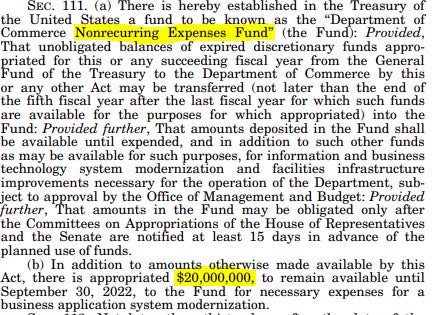Perhaps the single biggest legislative fight this year has been over federal spending.
There’s a good reason for that: The national debt is now an eye-popping $32.5 trillion (roughly $250,000 per household), and out-of-control deficit spending is one of the main reasons why families are struggling with inflation.
In May, Congress passed a bipartisan deal to raise the debt ceiling in exchange for reforms that would supposedly reduce spending levels.
Some parts of the deal were good, but as we learn more about the details of the package, it looks more and more like a raw deal for current and future taxpayers.
Rather than simply living with lower spending levels, Congress is going to extreme lengths to hide spending within the limits. Not only does this reduce the amount of inflation-fighting deficit reduction, but it could ultimately mean more spending when this year’s appropriations process is done.
The best example of that is an obscure, strangely worded provision tucked into the debt limit deal that provides $11 billion for a “Nonrecurring Expenses Fund” within the Department of Commerce.

If you haven’t heard of this, you’re not alone. The fund is meant to cover things like upgrading obsolete equipment owned by the federal government.
When Congress created the fund in 2019, they provided it only $20 million to last through 2022.

If the fund only needed $20 million over the span of 2019 through 2022, how could it use $11 billion now? The answer is: It can’t.
That’s because the $11 billion figure is an authorization; meaning, it allows spending up to that amount, like with a credit card limit. However, the fund is designed to spend only a much smaller amount in reality.
Congressional scorekeepers confirmed this when they analyzed the debt deal, estimating that only about 1% of the authorization would be used for spending.

Having such a big gap between potential spending and actual spending is very unusual in the federal government. That points to it being an enormous budget gimmick.
Sure enough, when the House Appropriations Committee produced its spending bills for the upcoming fiscal year that begins on Oct. 1, one of them rescinded (cut) the $11 billion in the fund.

So, Congress created a small fund for buying computers, then said the fund could spend up to $11 billion, and now is “cutting” the $11 billion just a few weeks later.
The reason for this convoluted scheme is that Congress is taking the $11 billion authorization that wouldn’t lead to new spending, “cutting” it, and using the “savings” on programs and bureaucracies — where there actually will be spending.
This would be like putting a $1 million unicorn in your family’s budget, then removing the unicorn and claiming you now have $1 million to spend on boats and luxury cars.
Incredibly, there’s still another level to the scheme.
Rather than addressing this Commerce Department fund in the spending bill that includes the Commerce Department, the Appropriations Committee placed the “cut” in the bill that funds the departments of Labor, Health and Human Services, and Education.
That’s because the latter bill is often the subject of intense spending fights due to it containing the programs and bureaucracies that Democrats cherish the most. With this $11 billion maneuver, Congress can protect funding for Dr. Anthony Fauci’s National Institutes of Health and university subsidies that help provide the infrastructure of the Left.
Consider that when a business or a person is accused of a massive fraud, it usually becomes headline news. Yet, in this case, with $11 billion in public money at stake, the odds of the mainstream media devoting breathless, scandal-style coverage to this are next to zero.
Fraud on this scale should be a national embarrassment and a political scandal rather than just another day in the swamp. Sadly, it’s par for the course in Washington.
Americans can’t count on the press to hold Congress accountable for mismanaging the nation’s finances. The public must stand up and demand immediate change, both to shore up the shaky “Bidenomics” economy and to prevent long-term decline were we to allow federal spending and debt to grow out of control.
The greatest nation on earth deserves better than to be undermined by accounting gimmicks.
Have an opinion about this article? To sound off, please email [email protected] and we’ll consider publishing your edited remarks in our regular “We Hear You” feature. Remember to include the url or headline of the article plus your name and town and/or state.




























